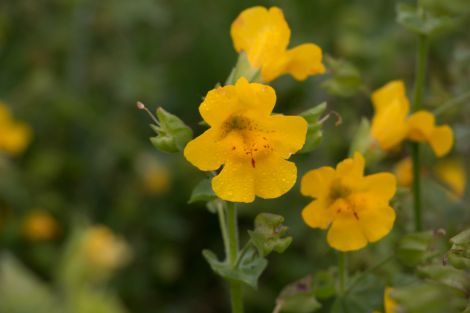News / Scientists discover ‘Shetland’s monkeyflower’
A NEW type of monkeyflower has been found in a Shetland ditch by researchers from the University of Stirling.
The new plant is a descendant of a non-native species, the yellow monkeyflower (Mimulus guttatus), which colonised the United Kingdom in Victorian times.
It has evolved in just 200 years through the doubling of the number of its chromosomes.
Researchers say the finding is significant as it shows that such major evolutionary step, known as genome duplication or polyploidy, can occur in non-native species over a short period of time, rather than over thousands of years.
Associate professor Dr Mario Vallejo-Marin said: “Evolution is often thought to be a slow process taking thousands or millions of years. Yet we show that a major evolutionary step can occur in a couple hundred years.”
The plant, referred to as ‘Shetland’s monkeyflower’, produces yellow flowers with small red spots. It is larger than the typical monkeyflower and its flowers are more open.
Genome duplication is common in the evolutionary history of flowering plants and many crops – such as potatoes, tobacco and coffee – are polyploids. However, it is rare to witness the phenomenon in recent history.
“The fact that the new polyploid involves a non-native plant is poignant, given the fact that human activities are transporting all sorts of animal and plant species well beyond their native habitats,” he said.
“This raises the possibility that non-native species may increasingly participate in major biological processes, including the formation of new types of plants and animals.”
A team from Stirling’s Biological and Environmental Sciences, working with Dr James Higgins at the University of Leicester, carried out tests after a “chance encounter” with the plant while conducting fieldwork near Quarff.
Become a member of Shetland News
Shetland News is asking its many readers to consider paying for membership to get additional features and services: -
- Remove non-local ads;
- Bookmark posts to read later;
- Exclusive curated weekly newsletter;
- Hide membership messages;
- Comments open for discussion.
If you appreciate what we do and feel strongly about impartial local journalism, then please become a member of Shetland News by either making a single payment, or setting up a monthly, quarterly or yearly subscription.






























































